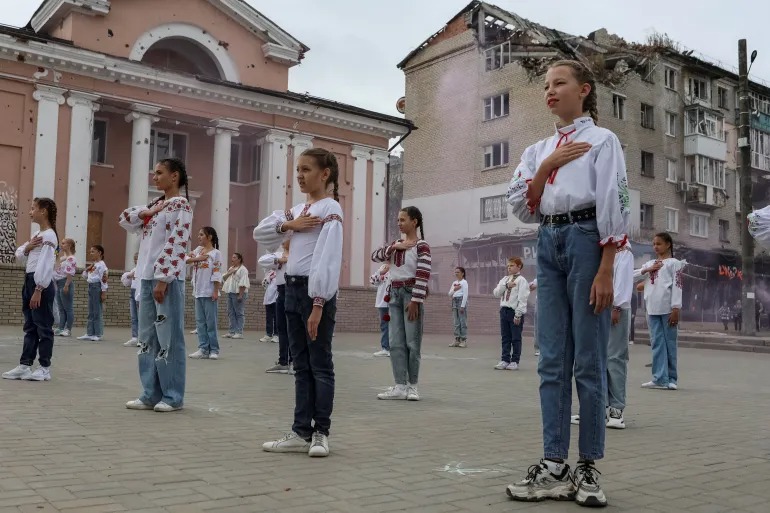In a heart-wrenching plea at the United Nations General Assembly (UNGA), Ukraine’s first lady, Olena Zelenska, has called upon world leaders to join forces in ensuring the return of thousands of Ukrainian children who have been forcibly taken by Russia during its full-scale invasion of the country. Ukraine asserts that over 19,000 innocent children have been illegally taken by Russia since the commencement of the conflict, and their fate remains a pressing concern. Belarus, a close Russian ally, recently reported the arrival of 48 Ukrainian children from occupied regions, raising further alarm bells. This humanitarian crisis has led to international condemnation and a demand for immediate action to reunite these children with their families.
Heartbreaking Numbers and a Desperate Plea
Amid the bustling corridors of the UNGA, Olena Zelenska revealed the staggering extent of the crisis, asserting that more than 19,000 Ukrainian children have been forcibly relocated to Russia and its occupied territories. Disturbingly, only 386 of them have been reunited with their families so far. The psychological trauma inflicted upon these young souls is profound, with Zelenska describing how they were systematically stripped of their Ukrainian identity, told that they were no longer Ukrainian but instead, Russian children. The world watches in horror as the magnitude of this humanitarian tragedy becomes increasingly evident.
Belarus’ Controversial “Holiday” Initiative
Belarus, a nation tightly aligned with Russia, has thrown another twist into this harrowing tale. Belarusian state media, Belta, recently reported the arrival of 48 Ukrainian children from the Donetsk, Luhansk, and Zaporizhia regions. The children were said to be in Belarus for a “three-week holiday.” However, this seemingly benevolent gesture has raised eyebrows, as it was organized by a Belarusian charity with the backing of President Alexander Lukashenko, who has previously referred to state-funded removals as a “recuperation” program. This development, perceived by some as an extension of Russia’s sinister tactics, only intensifies the urgency for international intervention.
The International Community Responds with Condemnation and Action
The gravity of the situation has not gone unnoticed on the international stage. The International Criminal Court (ICC) has issued arrest warrants for Russian President Vladimir Putin and Russia’s children’s rights commissioner, Maria Lvova-Belova, citing “reasonable grounds to believe” that they are responsible for war crimes, including the illegal deportation and transfer of children from occupied parts of Ukraine to Russia. Belarusian opposition figures have also provided the ICC with evidence showing over 2,100 Ukrainian children forcibly transferred to Belarus with Lukashenko’s approval. Ukraine alleges that these children are being indoctrinated and stripped of their national identity, a charge President Volodymyr Zelenskyy has termed a “genocide.” Russia, however, vehemently denies these allegations, insisting that they have rescued Ukrainian children from the horrors of war.
As the world grapples with the harrowing images of innocent children caught in the crossfire of conflict, the urgency to address this grave humanitarian crisis escalates. More than 500 children have lost their lives, and hundreds more have suffered injuries since Russia’s invasion of Ukraine began. Ukrainian authorities are also investigating disturbing cases of sexual violence against civilians, including children, by Russian soldiers. Olena Zelenska’s impassioned plea to the UN and the international community echoes the sentiments of a nation in turmoil: “Help us receive information on the children taken to Russia… Help us take children out of occupied territories through special safe corridors. Our children need justice.” The world’s response to this urgent call for action will undoubtedly define its commitment to the protection and welfare of innocent children in times of crisis.
















